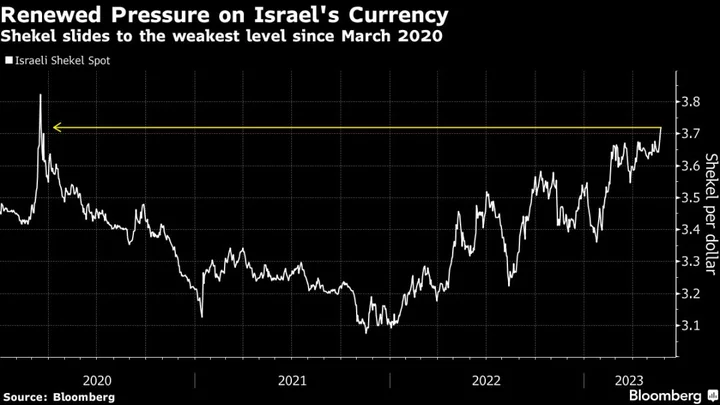Volatility is creeping back into Israel’s markets on renewed concerns over Prime Minister Benjamin Netanyahu’s plan to weaken the judiciary and its potential impact on investment.
The nation’s currency is headed for its biggest weekly loss since February, when Netanyahu’s efforts to wrest more power away from Israel’s courts triggered mass protests and later prompted Moody’s Investors Service to lower the country’s credit outlook. Netanyahu plans to revive the judicial proposal after parliament passed on Wednesday a new national budget, a move that could bring some stability to his right-wing coalition.
“With the budget now approved, Netanyahu is free to continue pursuing the judicial reform agenda, which could result in renewed demonstrations and place depreciation pressure on the shekel,” said Brendan McKenna, a New-York based emerging-markets economist and foreign exchange strategist at Wells Fargo Securities. “If governance deteriorates amid the judicial overhaul and other political priorities, we would expect foreign investor capital to exit Israel.”
Traders are hedging against the risk of bigger swings in the shekel, with the currency’s one-month implied volatility jumping by the most worldwide after the Turkish lira since Monday. The options market also added to bearish wagers against the Israeli currency this week by the most since March, according to three-month risk reversals.
A series of blows had weighed on the nation’s assets earlier this week — from a warning by Israel’s military chief that the country is preparing for a possible conflict with Iran to backlash over Netanyahu’s budget. Bending to the demands of his ultra-Orthodox partners in a shaky coalition government, much of the budget outlay will finance programs prized by ultra-Orthodox Jews that critics say would suppress rather than spur economic growth.
The shekel has slumped about 2% this week to trade at 3.7206 against the US dollar at 2:15 pm in London, near a three-year low. Traders see a 58% probability of the shekel weakening by about 2% to 3.8 per dollar over the next two months, up from 26% at the end of last week, according to Bloomberg calculations based on prices of put and call options.
In the equities market, the key TA-35 Index lost 3.1% after declining every single day this week. Local markets are closed Thursday for a holiday. The cost of protecting Israel’s debt against default rose on Wednesday by the most in five weeks to 63 basis points.
Ratings Downgrade
Netanyahu’s decision in late March to delay the judicial plan had provided some reprieve for the nation’s assets, with the shekel outpacing most other major developing currencies up to last week. But now, the specter of a further crackdown is keeping investors on edge.
Israel’s rating could be downgraded if the current tensions were to turn into a prolonged political and social crisis and hurt the economy, should it lead to a slowdown in capital inflows into the important high-tech sector and relocation of Israeli firms abroad, Moody’s said in a report last month.
“Until this week, the shekel had been a silent outperformer in May among EM peers,” said Eimear Daly, a London-based emerging-market strategist at NatWest. “Now it has to price back in the current government remaining in power and the controversial judicial legislation soon returning to parliament.”

